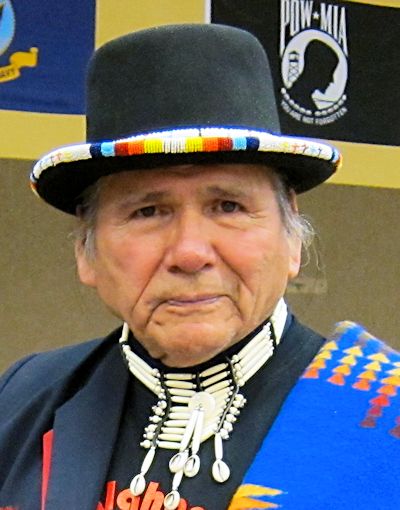Dennis Banks, a founder of the American Indian Movement who helped lead demonstrations — notably the 10-week siege at Wounded Knee, S.D., in 1973 — that at times descended into violence as they brought long-festering tribal wounds to national attention, died Oct. 29 at a hospital in Rochester, Minn. He was 80.

Photo courtesy of Wikimedia
The cause was complications from pneumonia after recent open-heart surgery, said a daughter, Arrow Banks.
Mr. Banks, a member of the Ojibwa, or Chippewa, tribe, helped form the American Indian Movement (AIM) in 1968 to challenge what he and other activists considered the U.S. government’s centuries-long exploitation of Native Americans. He traced his personal anger to his boyhood, when he was placed in Bureau of Indian Affairs boarding schools, which he compared to “concentration camps.”
A self-described “nightmare to the whole judicial system,” Mr. Banks spent periods as a fugitive or in prison for crimes associated with his demonstrations. To detractors, his apparent lawlessness did little to bolster his cause. But to supporters, Mr. Banks was a fearless defender of victimized peoples who, after years of oppression, had no recourse but dramatic resistance.
Along with AIM leader Russell Means, he became, in the description of the Los Angeles Times, one of the “most famous Indians since Sitting Bull and Crazy Horse,” the tribal leaders who defeated George Armstrong Custer at the Battle of the Little Bighorn in 1876.
Mr. Banks’s early protests included a takeover of Alcatraz, the island off San Francisco that was the site of an infamous penitentiary. Later, in 1972, he participated in an AIM occupation of the Bureau of Indian Affairs building in Washington.
But he was best recognized for his part in the 1973 occupation of Wounded Knee, where 83 years earlier U.S. forces had slaughtered 350 Lakota people at the end of the American-Indian Wars.
The 1973 uprising witnessed a confrontation between hundreds of Indians and hundreds of law-enforcement officers. Two Indians died, and a federal officer was paralyzed in the ensuing violence. By the time the incident ended after 71 dramatic days, international attention had been turned to the Indian movement as well as its tactics.
Mr. Banks and Means were charged with conspiracy, assault and theft in connection with the events, but a federal judge in 1974 dismissed the charges, citing government misconduct.
Mr. Banks faced more serious legal difficulty stemming from another demonstration, also in South Dakota, weeks before the Wounded Knee incident.
AIM activists including Mr. Banks had gathered at the Custer County courthouse to protest after the alleged white killer of an Indian man was charged with manslaughter rather than the higher offense of murder. The demonstration resulted in injuries to protesters and police officers, the destruction of two police cars, and fires at the courthouse and the Chamber of Commerce.
“We had reached a point in history where we could not tolerate the abuse any longer,” Mr. Banks told Peter Matthiessen, author of the book “In the Spirit of Crazy Horse.”
“These mothers could not tolerate the mistreatment that goes on on the reservations any longer, they could not see another Indian youngster die.”
In 1975, Mr. Banks was convicted of rioting and assault. Saying that he feared for his life in prison, he went on the run. His cause was bolstered by Hollywood figures including Jane Fonda and Marlon Brando, as well as by the legal representation of attorney William Kunstler.
Mr. Banks found a haven in California, then led by Gov. Jerry Brown, and later on an Onondaga reservation in New York. He surrendered to authorities in 1984, was imprisoned and then was paroled the following year.
Dennis James Banks — his Ojibwa name was Nowacumig, meaning “at the center of the universe” — was born on the Leech Lake Reservation in Minnesota on April 12, 1937.
He described the experience of being taken to boarding school as a “dark day in the lives of all Indian children.”
“They are forcibly taken away from those who love and care for them, from those who speak their language,” he recalled in a memoir, “Ojibwa Warrior” (2004), written with Richard Erdoes. “They are dragged, some screaming and weeping, others in silent terror, to a boarding school where they are to be remade into white kids.”
He served in the Air Force in Japan, where he married a Japanese woman and fathered a child. The Los Angeles Times reported that he was married at least five times. Arrow Banks said her father had 20 children and more than 100 grandchildren, but a complete list of survivors was not immediately available.
Upon his return from military service, Mr. Banks told People magazine in 1984, “I was heading down a road that was filled with wine, whiskey and booze. . . . Then I landed in prison.”
He said he served “two years, seven months and 18 days” for burglarizing a grocery store while a white accomplice received probation. The experience galvanized Mr. Banks to help found AIM.
During his sojourn in California, he taught classes at Stanford University. After his imprisonment in South Dakota, he said that he decided he “could best help by staying out of politics altogether.” He provided addiction counseling and ran a rice and maple syrup company that aimed to bring jobs to reservations.
Like Means, who died in 2012, Mr. Banks acted in films including “War Party” (1988) and “The Last of the Mohicans” (1992).
Despite the efforts of AIM, reservation residents continue to live in what are universally recognized as disastrous conditions. Looking back on AIM’s work, Mr. Banks nonetheless saw progress.
“An awareness reached across America that if Native American people had to resort to arms at Wounded Knee, there must really be something wrong,” he said.
“And Americans realized that native people are still here, that they have a moral standing, a legal standing. From that, our own people began to sense their pride.”
Author: Emily Langer

